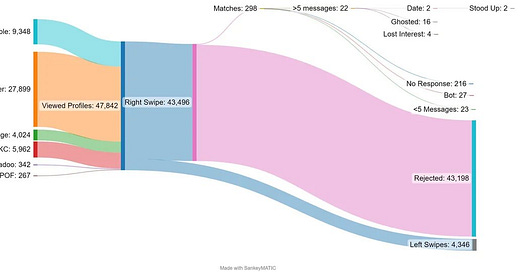
Bring Back the Sabbath
Epistemic Status: Several months of experimentation Previously: Choices are Bad, Choices Are Really Bad, Complexity Is Bad, Play in Easy Mode, Play in Hard Mode, Out to Get You, Slack
For More Thoughts After: Sabbath Commentary
Alternate Take (Endorsed): Sabbath Hard and Go Home.
Slack is life. It is under attack. We must fight for it. Choices Are Bad. Really Bad. We need a break. Complexity Is Bad. We need a break. Work is exhausting. We need a break. Relaxation is hard. Our attempts fail or backfire. The modern world is Out to Get You. We need a break. We need time for ourselves. Time that is truly our own. Without setting aside such time, that won't happen. Even when you take time, you'll be continuously choosing to take time, and... well, whoops. Modern life made the problem worse, but the problem is ancient. The ancients had an answer. We need rules. We need ritual. We need the Sabbath.
Cabin in the Woods
The parallels of my and Ben Hoffman's Sabbath realizations are striking. A few months ago, like Ben, I needed a break. My job puts me under constant pressure. My weekends weren't refreshing me. Like Ben, I experimented with camping. Like Ben, I had no spare battery, and left my phone off. I read The Great Transformation. I had meant to do that for weeks. I loved the world leaving me alone. Like Ben, I could relax, slow down, think. I wasn't worried about things I could be doing - I couldn't do them. Could I get this without the trip? Friends had started hosting Friday night dinners.
What about the whole thing? What if we brought back the Sabbath? Tradition makes rules easier to justify and explain, to others and yourself. These rules were time tested. I could take them and make them my own. I thought about the components. Which made sense? What rules would let me cut the enemy, and relax?
Return of the Ritual
Rituals need clear beginnings and endings. Sabbath begins with candles. One lights two candles, and recites a blessing. For the evening meal, one says additional words and blessings, drinks wine, eats bread from one of two whole loafs and sits down to a proper meal with friends and family. The candles are a signpost and deadline.
Your week is complete and your work is done. There will be guests, so the apartment is ready. The ritual objects, and your needs for tomorrow, are secured. The meal is prepared. Time to feast and relax!
Slack is thus preserved in five ways.
This creates a time and place to see friends and family. Most want more social events, but coordination is hard and events are work. Now there's always Friday night.
They increase the value of improving your home. Every week you notice the little things that enrich meal, visit and home. They're Worth It, but easy to forget. Enhancing the little things enhances your life. They prevent accumulation of personal-and-home-related work debt. A chaotic house is not restful.
Postponed chores weigh on you. The deadline forces handling them in advance. Payoff is immediate. By moving work before the deadline you are forced to make time during the week. You don't eat into Slack.
If you can't find the time, this alerts you. Emergency! They create visible failure as you approach hard bounds. When emergency arises, you sacrifice from the ritual. This signals emergency before life falls apart. You still have reserves. The ritual is Slack.
Sabbath ends with another candle. This prevents doing work until you go through non-trivial motions. You must do it on purpose.
Four Freedoms
We need restrictions that free us from the world. We need a new four freedoms.
We need freedom from work. Decide what counts as work to you. Don't do that. Anything done for money is automatically work. During the week, time is money. Today, do what you value.
We need freedom from interruption. Space to think. Cut off the outside world. Especially cut off anything continuously updating and all periodic rewards. There lie Skinner boxes. Much of the world is out to get you. Today it can wait. Friendly visitors are welcome, but ideally arranged in advance.
We need freedom from choice. Full freedom from choice requires a step beyond the traditional rules. In my version, even among permitted activities, only those explicitly selected in advance are available - particular books, radio stations and so forth - plus things you feel intrinsic motivation to do. No lists. No browsing.
We need freedom from stress. Stressful conversations are not allowed. Doing work is not allowed. Making decisions is not allowed. Outside information is not allowed. If something was still going to stress you out and it was fixable, fix it before the Sabbath. Things can't change on their own, and you can't make them change. Why stress?
Sabbath Easy, Sabbath Easy, Sabbath Hard
Tension exists between that which is most restful right now, and that which would be a stable set of rules.
There are two Easy Modes, representing each extreme.
One extreme is Orthodox Sabbath. This uses a strict, fixed set of rules. Pure deontology. You can't carry objects without special preparations. Many objects you can't even touch. This interferes a lot with relaxation, and forces realignment of life to prevent that. That can be good. There are even rules about violating the spirit of the rules - if you violate the spirit without breaking even those rules, that's almost encouraged. Restrictions allow maximization.
Another extreme is Reform Sabbath. This asks, what would be most restful today? This is utilitarian and uses causal decision theory. Sabbath is for rest, so if driving a car or making a call would be more restful, do that. You could break the rules. This destroys freedom from choice. Who respects such boundaries? You won't have urgency before the Sabbath. You can handle things later. Wouldn't that be more restful?
The Hard Mode approach asks, what sustainable rule set best preserves long run Slack? Taking stock and encouraging Slack-preserving outside the Sabbath are explicit goals. It uses logical decision theory. It creates personalized rules you can follow that work for you, but understands each divergence you select is expensive. It asks what would be in the spirit of the rules, and modifying the rules to reflect that spirit. It views breaking current rules during the Sabbath with extreme skepticism, to reinforce following the rules. It modifies rules on Sunday.
In choice-related ways my current system is more restrictive than the Orthodox version. Mostly it is less restrictive, but becoming more restrictive over time. I currently allow Level 4 but everything there is on the chopping block. On Friday night I restrict to Level 2.
Hierarchy of the Shabbistic
There exists a hierarchy of shabbisticness. At one end are activities aligned with the goals of relaxing, recharging and unplugging. Sleep certainly qualifies. At the other are activities perfectly in conflict with those goals. Work done for money. The hierarchy's details are different for different people. If you see something as work, it drains you. Move it down towards the unshabbistic. If you see something as invigorating, and have the spontaneous urge to do it for intrinsic reasons, move it up towards the shabbistic. Then draw a hard line. Deciding whether to allow something is an impactful choice (itself banned) and a slippery slope. The golden rule of Sabbath is not breaking the rules. When in doubt, don't do the thing, then refine your rule on Sunday. I encourage stricter rules for Friday night than Saturday. This enriches without being stifling. This is my current hierarchy. Levels 1-2 I consider purely good, Levels 3 good, Level 4 questionable. Level 5 is bad, Level 6 very bad. Level 7 is banned all week.
Pure rest. Sleep. Rest. Walking. Intellectual discussion. Friendly discussion. Reading physical books and other physical objects. Meditation. Museums. Taking a bath.
Active rest. Sex. Flirting. Running. Swimming. Playing sports. Arguments for low stakes. Board and card games with no stakes. Puzzles. Building models. Taking a shower. Eating. Watching sports in person. Light switches.
Consumptive rest. Riding elevators. Radio with one station. Listening to music. Food preparation without lighting a fire. Window shopping. Kindle and other e-books.
Potentially toxic actions. Writing for yourself. Taking notes. Practicing and training personal skills that are not work or work related. Working out. Computer games. Pre-selected television. Phone calls and texts for physical coordination purposes. Riding in cars and trains (without payment).
Violations of compactness. Phone calls and texts not for same-day logistical coordination. All other use of smartphones. Making impactful decisions. Planning. Flipping stations on television or radio. Browsing the internet. Browsing a giant music collection. All long lists, especially lists of choices. Checking anything that continuously updates. Lighting a fire. Stressful topics of conversation.
Work and outside demands. Exchange of money. Doing business. Anything that earns money or creates commercial value. Negotiations. All continuous updates. Email.
Considered harmful. All timed and daily rewards. Micro-transactions. Social media.
The Rules Simplified
Start here. Adjust as needed. Light candles before sundown Friday to begin. No outside inputs except in person. No choices impacting post-Sabbath. Light and extinguish no fires. Do no work or business. Spend no money. Only preselected and spontaneously motivated actions are allowed. No browsing. No lists. Light another candle after sundown Saturday to end.
State of Emergency
I brought back Sabbath for Slack and relaxation. Ben brought it back as an alarm system, for when life was out of control. Sabbath shows when you are not okay, and provides method and incentive to get back to okay. This Saturday I did full Orthodox Sabbath (minus prayer), and also fasted, as an experiment. I won't do this every week or even month, but it had important alarm value. Ben's post is excellent. Read the whole thing. I'll finish with two key passages from it. Key motivation:
You would not want to do this sort of thing all the time. But it might make sense to do periodically - perhaps once a week - as a stopgap measure to combat attention drift. If powerful and pervasive cultural forces are out to get you, you ought to check in from time to time with yourself, and other people with whom you have local, high-quality relationships, to give yourself a chance to notice whether you have gotten got for too much.
His conclusion is important and worth quoting in full:
One more useful attribute of the Jewish Sabbath is the extent to which its rigid rules generate friction in emergency situations. If your community center is not within walking distance, if there is not enough slack in your schedule to prep things a day in advance, or you are too poor to go a day without work, or too locally isolated to last a day without broadcast entertainment, then things are not okay.
In our commercialized society, there will be many opportunities to purchase palliatives, and these palliatives are often worth purchasing. If living close to your place of employment would be ruinously expensive, you drive or take public transit. If you don’t have time to feed yourself, you can buy some fast food. If you’re not up for talking with a friend in person, or don’t have the time, there’s Facebook. But this is palliative care for a chronic problem.
In Jewish law, it is permissible to break the Sabbath in an emergency situation, when lives are at stake. If something like the Orthodox Sabbath seems impossibly hard, or if you try to keep it but end up breaking it every week - as my Reform Jewish family did - then you should consider that perhaps, despite the propaganda of the palliatives, you are in a permanent state of emergency. This is not okay. You are not doing okay.
So, how are you?







